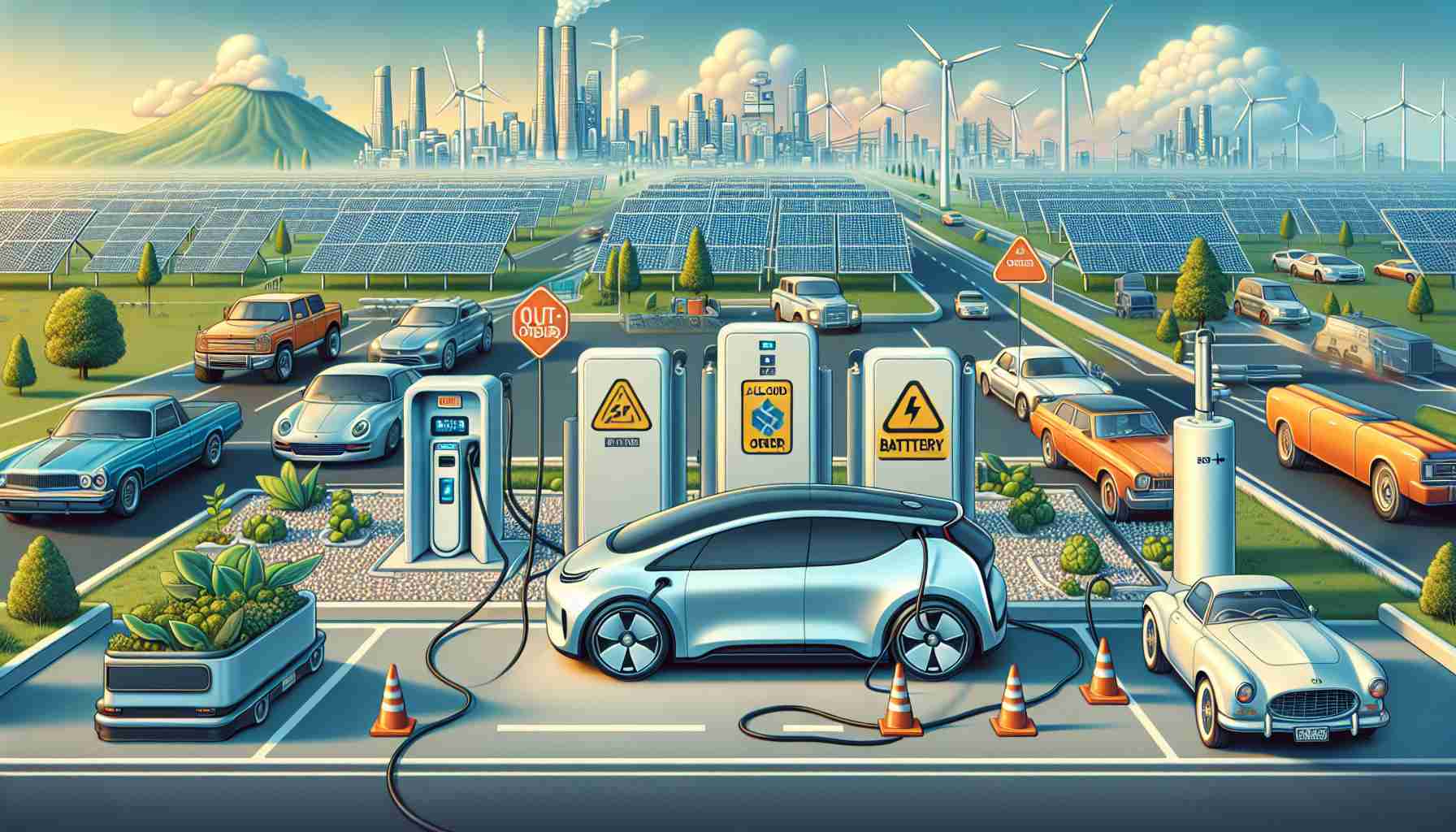Rethinking Energy Storage: Why All-Solid-State Batteries Matter
In a world rapidly transitioning to sustainable energy solutions, Hyundai Motor Company is poised to lead the charge with its revolutionary all-solid-state battery technology. These batteries are not just a step forward for electric vehicles; they represent an evolution in how we understand and utilize energy storage.
The Science: How It Works
Unlike traditional lithium-ion batteries, all-solid-state batteries eliminate the use of liquid electrolytes. Instead, they employ solid materials, which not only enhance safety by reducing the risk of fire but also increase energy density significantly. This leads to longer ranges for electric vehicles, which could revolutionize the driving experience as we know it.
Beyond Electric Vehicles: Implications for Other Industries
While Hyundai’s primary focus is on integrating these batteries into electric vehicles by 2025, the implications extend beyond the automotive industry. Sectors such as aviation and renewable energy could also benefit from the higher efficiency and safety of all-solid-state technology. As other companies like Factorial Energy and Honda explore similar avenues, the potential for cross-industry innovation is vast.
Looking Ahead: Challenges and Opportunities
Despite their promise, scaling up production of all-solid-state batteries poses significant challenges. Manufacturing costs and processes need refinement to make these batteries economically viable. Moreover, consumer education will be key to overcoming any initial resistance to this new technology.
Final Thoughts: A Bold Step into the Future
Hyundai’s bold move into all-solid-state batteries marks a pivotal moment in the energy landscape. As we edge closer to 2025, this technology could set a global standard for energy storage, pushing the boundaries of what’s possible in sustainable transportation. Keep an eye on Hyundai as it reshapes the future of mobility.
Revolutionizing Energy Storage: The Environmental and Economic Impact of All-Solid-State Batteries
As the world stands on the cusp of a green energy revolution, Hyundai Motor Company’s foray into all-solid-state battery technology is a significant stride towards sustainable energy solutions. These batteries promise not only to redefine electric vehicles but also to spearhead a broader shift in energy storage technology, impacting environmental sustainability, the global economy, and the future of humanity.
Environmental Impact
All-solid-state batteries offer a noteworthy environmental advantage over traditional lithium-ion batteries. By eliminating liquid electrolytes, the risk of battery fires is significantly reduced, thereby lowering the environmental hazards associated with battery manufacturing, usage, and disposal. Moreover, the increased energy density in these batteries means electric vehicles could travel longer distances using less power, reducing the overall demand on energy grids primarily fueled by fossil fuels.
The adaptation of all-solid-state technology in sectors beyond automotive—such as aviation and renewable energy—could further reduce carbon footprints globally. Aviation, a notoriously high-emission industry, stands to benefit greatly if aircraft can be powered by batteries that are not only safer but also more efficient. Similarly, integrating this technology into renewable energy systems could enhance storage capabilities for solar and wind power, smoothing out supply fluctuations and reducing reliance on fossil fuel power plants.
Economic Implications
The economic potential of all-solid-state batteries is substantial. With improved battery performance, electric vehicles (EVs) become a more viable option for consumers, leading to wider adoption and bolstering the EV market. This transition could catalyze growth in associated sectors like EV infrastructure, charging solutions, and energy systems, creating numerous jobs and opportunities in green technology fields.
However, realizing these benefits is contingent upon overcoming production hurdles. Current manufacturing processes for all-solid-state batteries are costly and complex. Industries are challenged to innovate these processes to make them economically feasible on a large scale. Success in this area could position companies like Hyundai and its contemporaries as leaders in an emerging energy sector, bridging the gap from niche to mainstream use.
The Future of Humanity
As humanity endeavors to mitigate climate change and embrace sustainable living, technologies like all-solid-state batteries will be pivotal. By advancing energy storage solutions, they contribute not just to a reduction in emissions but also to the stabilization of energy prices, providing a reliable energy framework that is less susceptible to fluctuations caused by environmental or geopolitical factors.
In a broader context, the global shift towards these advanced batteries could inspire further technological innovations, prompting interdisciplinary efforts to address environmental issues comprehensively. This could lead to a domino effect, fostering a sustainable economic model where cleaner, efficient energy solutions become standard practice.
The pioneering efforts of Hyundai and similar trailblazers could ultimately reshape how humanity understands and interacts with energy, setting the foundation for a future where sustainable practices are not just encouraged but embedded into the fabric of daily life. As we approach 2025, the ongoing development and deployment of all-solid-state batteries could pave the way for a greener, more sustainable, and economically stable future for our planet.
Unleashing the Future: All-Solid-State Batteries in a New Light
In the race towards sustainable energy solutions, Hyundai Motor Company is making headlines with its groundbreaking all-solid-state battery technology. This innovation is shaping the future of energy storage and pushing the boundaries of what we expect from sustainable mobility.
Delving Into the Science: The Impact of All-Solid-State Batteries
All-solid-state batteries stand out for their ability to eliminate liquid electrolytes, using solid materials instead. This shift not only boosts safety by minimizing fire risks but also enhances energy density significantly, which in turn promises extended ranges for electric vehicles, fundamentally altering how we perceive driving distances.
Application Beyond Vehicles: Broadening Horizons
While Hyundai’s immediate goal is to deploy these batteries in electric vehicles by 2025, the potential applications span beyond automotive use. Industries such as aviation and renewable energy can benefit significantly from this technology’s enhanced efficiency and safety. Companies like Factorial Energy and Honda are exploring similar innovations, suggesting a vast landscape of cross-industry applications for all-solid-state batteries.
Navigating Production Challenges: Paving the Way for Wider Adoption
Despite the groundbreaking promise of all-solid-state batteries, there are hurdles to overcome, particularly in scaling production. Refining manufacturing costs and processes is crucial to making these batteries affordable and viable on a large scale. Furthermore, initiatives to educate consumers about the advantages of this technology are essential for overcoming initial skepticism and driving market acceptance.
The Path Ahead: Setting New Standards in Energy Storage
Hyundai’s pioneering move into all-solid-state batteries symbolizes a significant shift within the energy sector. As 2025 approaches, this technology holds the potential to redefine global standards in energy storage and sustainable transportation. The development and widespread adoption of all-solid-state batteries could accelerate the transition to greener energy, with Hyundai at the forefront of this transformation.
For more information on Hyundai’s innovations and developments, visit the Hyundai website.
Insights & Predictions: The Future Landscape as We See It
The adoption of all-solid-state batteries could herald a new era in the global energy market. Industry analysts predict that as technological advancements continue, manufacturing costs will decrease, encouraging widespread adoption across various sectors. This evolution not only has the potential to reshape personal transportation but also to impact industrial operations and contribute significantly to global sustainability goals.
In conclusion, Hyundai’s commitment to all-solid-state batteries is more than just a technological advancement; it’s a bold leap into an adaptable and resilient energy future. As we look towards 2025 and beyond, the innovations fueled by this technology hold promise for a more sustainable and energy-efficient world.









